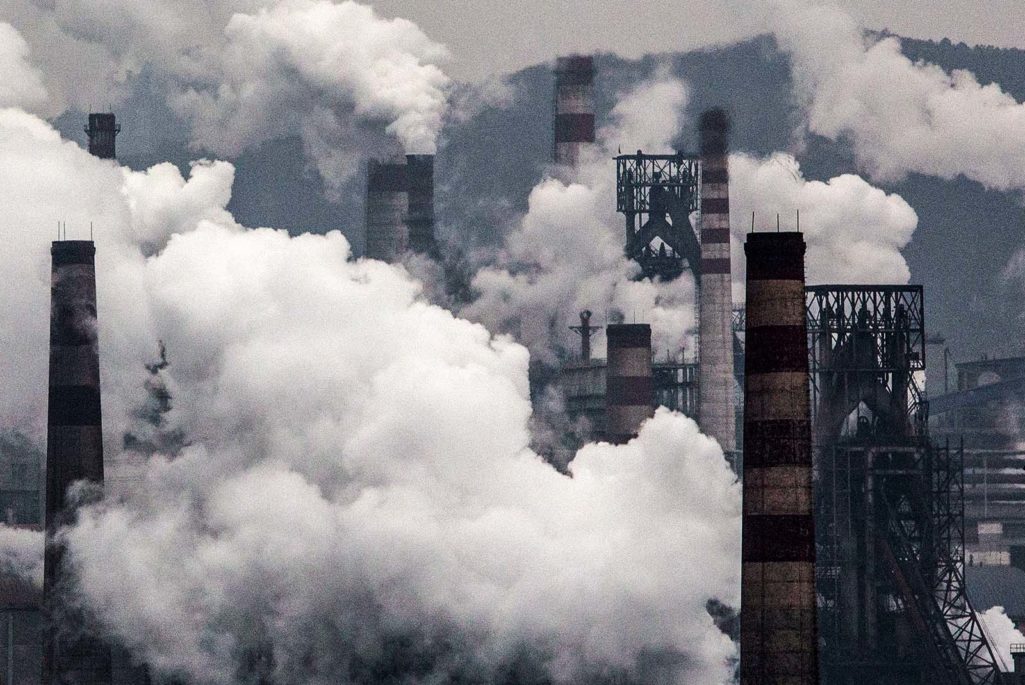The Case for Carbon ‘Take Back’ Schemes

Smoke billows from smokestacks and a coal fired generator at a steel factory on November 19, 2015 in the industrial province of Hebei, China. China's government has set 2030 as a deadline for the country to reach its peak for emissions of carbon dioxide.
Photo: Kevin Frayer/Getty Images
I wonder how many of the delegates in Paris realize that they have just created the mother of all “take-back schemes.”
As a consumer, you may have already come across this sort of deal: If you don’t want to dispose of the packaging of your new sofa, you can take it back to IKEA and it’s their problem. In many places, you can even take back the sofa itself when your kids have wrecked it. For the Paris climate deal to succeed, something similar will have to happen, where companies that rely on fossil fuels will be obliged to “take back” their emissions.
The agreement reaffirms a commitment to stabilizing temperature rises well below 2℃, and even retains the option of limiting warming to 1.5℃ if possible. But it also confirms national targets that do little more than stabilize global emissions between now and 2030.
Given those emissions, sticking to within 2℃ will require us to take lots of carbon out of the atmosphere and store it in the ground. The parties to the agreement are, in effect, saying, “We’re going to sell this stuff, and we’re going to dispose of it later.”
How do I know? Well, peak warming is overwhelmingly determined by cumulative carbon dioxide emissions. To stabilize temperatures at any level, be it 1.5℃, 2℃ or even 3℃, net carbon dioxide emissions must be reduced to zero. Most governments, environmental groups and business leaders now understand this. And it is acknowledged, albeit implicitly, in Article 4 of the Paris agreement, which calls for greenhouse emissions to be “balanced” by carbon sinks some time after mid-century.
But we’re unlikely to hit “net zero” emissions before temperatures reach 2℃, and even less likely before they reach 1.5℃. Warming is currently at about 1℃ and rising by 0.1℃ every five to ten years. We could slow the warming by reducing emissions, of course. But if we fail to reduce at the required rate—and the inadequate emissions targets indicate this is the intention—then we will be left with no option but to scrub the excess CO2 back out of the atmosphere in the future.
Sticking to within 2℃ will require us to take lots of carbon out of the atmosphere and store it in the ground.
Owners of Fossil Fuel Assets
That is why the deal is like a gigantic take-back scheme. The proof lies in what is not said in the Paris agreement. There is no explicit mention of a global carbon budget, for instance, which adds up total emissions since the industrial revolution. That is despite the fact that all governments have acknowledged, through the Intergovernmental Panel on Climate Change, the reality that stabilizing temperatures requires a limit on cumulative CO2 emissions. Certain countries simply cannot accept the suggestion that they may be obliged to leave some of their prized fossil carbon reserves underground.
And why should they? We do not need, and nor have we any right, to ban India from using its coal. We simply need to ensure that, by the time global temperatures rise 2℃ (or 1.5℃ if that is what is eventually deemed safe), any company that sells fossil fuels, or any carbon-intensive product like conventional cement, is obliged to take back an equivalent amount of CO2 and dispose of it safely to ensure it doesn’t end up in the atmosphere.
Right now, that means re-injection underground; forests can’t be relied on over geological timescales, as they might burn down, or even die out and re-release their carbon due to climate change itself. But there are plenty of other creative ideas for carbon dioxide disposal; someone just needs the incentive to do it.
And who better than the owners of the fossil fuel assets at the heart of the problem? Logically, the cost of CO2 disposal should be borne by the seller of fossil carbon. If it is paid for out of general taxation, no one will have any incentive to minimize the carbon content in the products they sell or buy, nor will companies have an incentive to minimize the cost of disposal. Relying on taxpayers to pay for disposal makes such a policy vulnerable every time the purse strings are tightened.
The idea of a “CO2 take-back” scheme was suggested by Nick Robins, a UN sustainability advisor, at a recent event in Paris. It may have been meant as a whimsical aside, but it really is the only feasible way of stabilizing the climate. The alternative—a global ban on fossil fuel extraction and use—is neither ethical nor enforceable.
Fantasy Scenarios
Enthusiasts for renewable energy would like us to believe they can make it cheaper than coal, so a global ban would be unnecessary. But there will still be cement, jet fuel, fertilizer—the list is endless. The idea that we will develop a cheaper substitute for every single application of fossil carbon everywhere in the world before temperatures reach 2℃, is pure fantasy. As Ottmar Edenhofer, one of the world’s leading climate economists, put it, “As a Catholic, I believe in miracles, but I do not rely on them.”
Of course, if we include the costs of take-back, then high-carbon products will become more expensive, which is all good for renewables. But unlike new taxes, take-back schemes are generally popular, despite industry’s dire warnings about increased costs.
People understand that the main beneficiary of fancy packaging is the company selling the product. Even at today’s prices, the main beneficiary of our continued use of fossil fuels is not the long-suffering consumer, nor even the firm with its logo on the pump, but those who hoover up the royalties, taxes and rents as fossil fuels come out of the ground.
Earlier this year, I suggested that something like a CO2 take-back scheme (although not with nearly such a catchy name) should be considered in the UK energy bill, and was promptly taken out for a coffee by a well-spoken industry lobbyist to tell me what a bad idea it was. To my mind, that rather suggested that I was onto something.
“Mandatory sequestration” hasn’t really caught on in the environmental movement, partly, I’m sure, because it is a bit of a mouthful for any campaigner. But stack up the net zero emissions point against the inadequate national targets and you soon realize that all those shouting “1.5 to stay alive” in Paris (and there were plenty) were actually advocating a crash program of CO2 disposal. #takebackCO2—start tweeting it now.
This piece first appeared in The Conversation.






